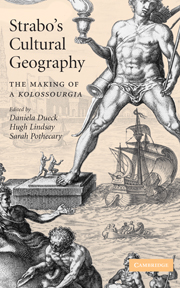Book contents
- Frontmatter
- Contents
- List of maps
- List of illustrations
- List of tables
- List of figures
- List of contributors
- Acknowledgements
- List of abbreviations
- Introduction
- 1 Kolossourgia. ‘A colossal statue of a work’
- 2 Reflections of philosophy: Strabo and geographical sources
- 3 Who is a barbarian? The barbarians in the ethnological and cultural taxonomies of Strabo
- 4 Gender at the crossroads of empire: locating women in Strabo's Geography
- 5 Strabo and Homer: a chapter in cultural history
- 6 Strabo's use of poetry
- 7 Strabo's sources in the light of a tale
- 8 The foundation of Greek colonies and their main features in Strabo: a portrayal lacking homogeneity?
- 9 Ανδρες ἔνδοξοι or ‘men of high reputation’ in Strabo's Geography
- 10 Comparing Strabo with Pausanias: Greece in context vs. Greece in depth
- 11 The European provinces: Strabo as evidence
- 12 Amasya and Strabo's patria in Pontus
- 13 Cappadocia through Strabo's eyes
- 14 Greek geography and Roman empire: the transformation of tradition in Strabo's Euxine
- 15 Josephus' hidden dialogue with Strabo
- 16 Temporal layers within Strabo's description of Coele Syria, Phoenicia and Judaea
- Bibliography
- Index of geographical names
- Index of personal names
11 - The European provinces: Strabo as evidence
Published online by Cambridge University Press: 18 December 2009
- Frontmatter
- Contents
- List of maps
- List of illustrations
- List of tables
- List of figures
- List of contributors
- Acknowledgements
- List of abbreviations
- Introduction
- 1 Kolossourgia. ‘A colossal statue of a work’
- 2 Reflections of philosophy: Strabo and geographical sources
- 3 Who is a barbarian? The barbarians in the ethnological and cultural taxonomies of Strabo
- 4 Gender at the crossroads of empire: locating women in Strabo's Geography
- 5 Strabo and Homer: a chapter in cultural history
- 6 Strabo's use of poetry
- 7 Strabo's sources in the light of a tale
- 8 The foundation of Greek colonies and their main features in Strabo: a portrayal lacking homogeneity?
- 9 Ανδρες ἔνδοξοι or ‘men of high reputation’ in Strabo's Geography
- 10 Comparing Strabo with Pausanias: Greece in context vs. Greece in depth
- 11 The European provinces: Strabo as evidence
- 12 Amasya and Strabo's patria in Pontus
- 13 Cappadocia through Strabo's eyes
- 14 Greek geography and Roman empire: the transformation of tradition in Strabo's Euxine
- 15 Josephus' hidden dialogue with Strabo
- 16 Temporal layers within Strabo's description of Coele Syria, Phoenicia and Judaea
- Bibliography
- Index of geographical names
- Index of personal names
Summary
My research for this paper was prompted by the realisation that a reading of Strabo's Geography yields little impression of how the Roman world was divided and arranged into provinces. Strabo is often supposed to have been motivated in his work by the expansion of the Roman empire, and consequently he might be expected to have some considerable interest in its provincial structure. As it turns out, however, Strabo's remarks about the provinces are scattered and rather casual. I decided, therefore, to look at other evidence for the state of the provinces in the early part of Tiberius' reign. The result of combining the evidence of Strabo with the evidence provided by inscriptions and other literary sources is interesting. It suggests that Strabo is a more valuable witness than he first appears; and that his imprecise attitude towards the provinces may have its roots in the imprecision of provincial structure at this stage in the development of the Roman empire.
I take the years from 17 or 18 ce to 23 ce to be the period during which the Geography was written out. While, in general, it may be admirable to keep an open mind on the question of the date of the Geography, when it comes to using Strabo as evidence for provincial development, a more specific approach is necessary. I take it that references in the present tense by Strabo are to circumstances in 17/18–23 ce, i.e. the early years of Tiberius' reign.
- Type
- Chapter
- Information
- Strabo's Cultural GeographyThe Making of a Kolossourgia, pp. 161 - 179Publisher: Cambridge University PressPrint publication year: 2005



